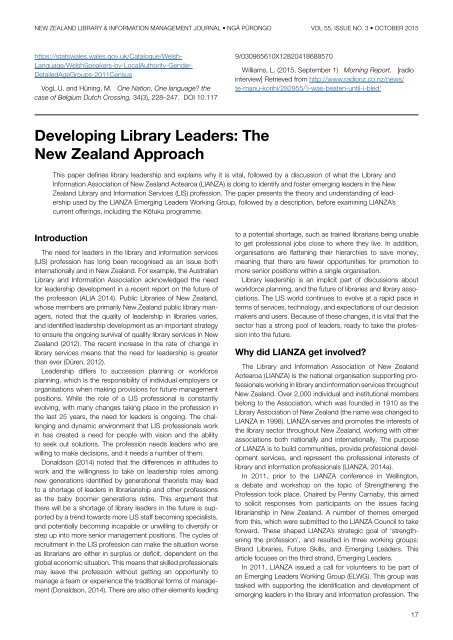THE NEW ZEALAND LIBRARY & INFORMATION MANAGEMENT JOURNAL NGĀ PŪRONGO
NZLIMJ%20Vol%2055%20Issue%203
NZLIMJ%20Vol%2055%20Issue%203
You also want an ePaper? Increase the reach of your titles
YUMPU automatically turns print PDFs into web optimized ePapers that Google loves.
<strong>NEW</strong> <strong>ZEALAND</strong> <strong>LIBRARY</strong> & <strong>INFORMATION</strong> <strong>MANAGEMENT</strong> <strong>JOURNAL</strong> • <strong>NGĀ</strong> <strong>PŪRONGO</strong> VOL 55, ISSUE NO. 3 • OCTOBER 2015<br />
https://statswales.wales.gov.uk/Catalogue/Welsh-<br />
Language/WelshSpeakers-by-LocalAuthority-Gender-<br />
DetailedAgeGroups-2011Census<br />
Vogl, U. and Hüning, M. One Nation, One language? the<br />
case of Belgium Dutch Crossing, 34(3), 228–247. DOI 10.117<br />
9/030965610X12820418688570<br />
Williams, L. (2015, September 1) Morning Report. [radio<br />
interview] Retrieved from http://www.radionz.co.nz/news/<br />
te-manu-korihi/282955/’i-was-beaten-until-i-bled’<br />
Developing Library Leaders: The<br />
New Zealand Approach<br />
This paper defines library leadership and explains why it is vital, followed by a discussion of what the Library and<br />
Information Association of New Zealand Aotearoa (LIANZA) is doing to identify and foster emerging leaders in the New<br />
Zealand Library and Information Services (LIS) profession. The paper presents the theory and understanding of leadership<br />
used by the LIANZA Emerging Leaders Working Group, followed by a description, before examining LIANZA’s<br />
current offerings, including the Kōtuku programme.<br />
Introduction<br />
The need for leaders in the library and information services<br />
(LIS) profession has long been recognised as an issue both<br />
internationally and in New Zealand. For example, the Australian<br />
Library and Information Association acknowledged the need<br />
for leadership development in a recent report on the future of<br />
the profession (ALIA 2014). Public Libraries of New Zealand,<br />
whose members are primarily New Zealand public library managers,<br />
noted that the quality of leadership in libraries varies,<br />
and identified leadership development as an important strategy<br />
to ensure the ongoing survival of quality library services in New<br />
Zealand (2012). The recent increase in the rate of change in<br />
library services means that the need for leadership is greater<br />
than ever (Düren, 2012).<br />
Leadership differs to succession planning or workforce<br />
planning, which is the responsibility of individual employers or<br />
organisations when making provisions for future management<br />
positions. While the role of a LIS professional is constantly<br />
evolving, with many changes taking place in the profession in<br />
the last 25 years, the need for leaders is ongoing. The challenging<br />
and dynamic environment that LIS professionals work<br />
in has created a need for people with vision and the ability<br />
to seek out solutions. The profession needs leaders who are<br />
willing to make decisions, and it needs a number of them.<br />
Donaldson (2014) noted that the differences in attitudes to<br />
work and the willingness to take on leadership roles among<br />
new generations identified by generational theorists may lead<br />
to a shortage of leaders in librarianship and other professions<br />
as the baby boomer generations retire. This argument that<br />
there will be a shortage of library leaders in the future is supported<br />
by a trend towards more LIS staff becoming specialists,<br />
and potentially becoming incapable or unwilling to diversify or<br />
step up into more senior management positions. The cycles of<br />
recruitment in the LIS profession can make the situation worse<br />
as librarians are either in surplus or deficit, dependent on the<br />
global economic situation. This means that skilled professionals<br />
may leave the profession without getting an opportunity to<br />
manage a team or experience the traditional forms of management<br />
(Donaldson, 2014). There are also other elements leading<br />
to a potential shortage, such as trained librarians being unable<br />
to get professional jobs close to where they live. In addition,<br />
organisations are flattening their hierarchies to save money,<br />
meaning that there are fewer opportunities for promotion to<br />
more senior positions within a single organisation.<br />
Library leadership is an implicit part of discussions about<br />
workforce planning, and the future of libraries and library associations.<br />
The LIS world continues to evolve at a rapid pace in<br />
terms of services, technology, and expectations of our decision<br />
makers and users. Because of these changes, it is vital that the<br />
sector has a strong pool of leaders, ready to take the profession<br />
into the future.<br />
Why did LIANZA get involved?<br />
The Library and Information Association of New Zealand<br />
Aotearoa (LIANZA) is the national organisation supporting professionals<br />
working in library and information services throughout<br />
New Zealand. Over 2,000 individual and institutional members<br />
belong to the Association, which was founded in 1910 as the<br />
Library Association of New Zealand (the name was changed to<br />
LIANZA in 1998). LIANZA serves and promotes the interests of<br />
the library sector throughout New Zealand, working with other<br />
associations both nationally and internationally. The purpose<br />
of LIANZA is to build communities, provide professional development<br />
services, and represent the professional interests of<br />
library and information professionals (LIANZA, 2014a).<br />
In 2011, prior to the LIANZA conference in Wellington,<br />
a debate and workshop on the topic of Strengthening the<br />
Profession took place. Chaired by Penny Carnaby, this aimed<br />
to solicit responses from participants on the issues facing<br />
librarianship in New Zealand. A number of themes emerged<br />
from this, which were submitted to the LIANZA Council to take<br />
forward. These shaped LIANZA’s strategic goal of ‘strengthening<br />
the profession’, and resulted in three working groups:<br />
Brand Libraries, Future Skills, and Emerging Leaders. This<br />
article focuses on the third strand, Emerging Leaders.<br />
In 2011, LIANZA issued a call for volunteers to be part of<br />
an Emerging Leaders Working Group (ELWG). This group was<br />
tasked with supporting the identification and development of<br />
emerging leaders in the library and information profession. The<br />
17


